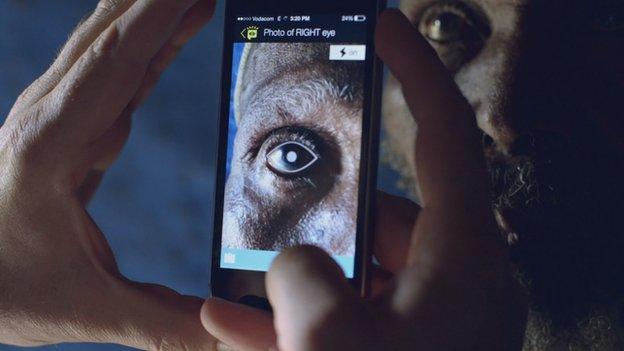Home care helps children 'breathe easy'
- Published
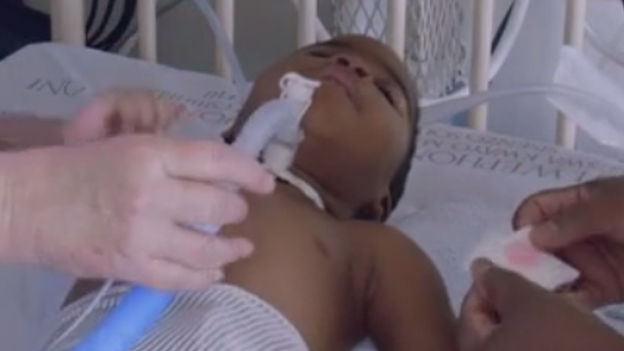
Shamim's mother was taught how to look after her daughter at home
Looking after a sick child can be a challenge for families, even with the highest level of support. A scheme in South Africa is helping parents - who don't have that support - to look after their children themselves.
Two-year-old Shamim has spent much of her life in hospital after experiencing recurrent chest infections.
Her condition has meant she has needed a tracheostomy - where surgeons create an artificial opening into the windpipe that is held open by a tracheostomy tube - and has been put on a ventilator to help her breathe.
Shamim's treatment left her weak and she had difficulty breathing.
Normally, a little girl as sick as Shamim would need to remain in hospital - with access to specialist care - for the foreseeable future. But she is one of hundreds of children who have benefitted from a scheme which teaches parents how to look after their sick children at home.
The 'Breatheasy' programme, run by Sister Jane Booth at the Red Cross War Memorial Children's Hospital in Cape Town, trains parents to take over the care for their technology-dependent children from the medical team at the hospital.
The programme is specifically designed for children who have tracheostomies or need to be on ventilators.
Sister Booth believes that these children are better off to returning home to their families and communities, rather than remaining in hospital.
But this can be dangerous, given the children's delicate medical condition.
She says: "This is a very unique programme, where a very, very complicated medical condition needs to be de-medicalised and simplified so that normal families are able to know and understand all of the procedures and be able to do everything for their own child so they can take them home."
Mum 'has the patience'
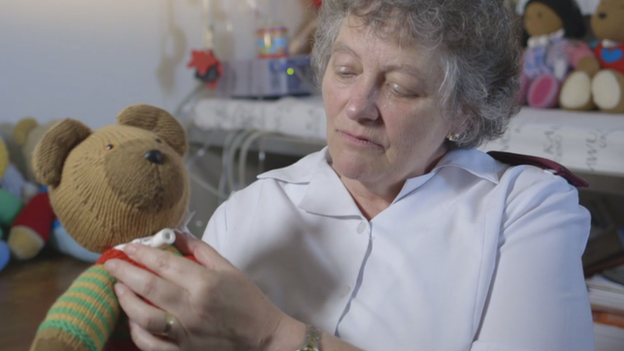
Sister Jane uses soft toys to demonstrate how a tracheostomy works
In more developed countries, if a child as sick as Shamim were to be sent home, nurses would visit regularly to carry out the tracheostomy changes and check the patient was well.
But Cape Town's health services simply cannot afford to fund such aftercare, so this programme makes sure parents can cope with their child on their own at home.
Sister Jane said it's much better for the child. "The amazing thing about parents is once they start doing the procedures they actually go better than when us nurses do them, because you know some mums can coax their children into lying still and letting mummy just do it and mum has the patience to do that."
Four-year-old Pamela is one of the children who has benefited from this programme.
She was very sick and under the care of the intensive care unit for several months.
Her parents Sam and Shermaine Ntanga were put on the training programme and told they could take Pamela home if they learnt how to look after her.
It wasn't easy, Shermaine was very nervous and remembers the first time she tried to change the tracheostomy.
Sister Jane Booth explains how parents are taught to care for their sick children at home
"The first time was not good at all ... I actually ran away and I left Sister Jane alone with Pamela.
"But she calmed me down and said it's okay Shermaine, tomorrow we'll try it again."
Pamela's parents eventually came to grips with the training and were able to take her home with a tracheostomy, fully ventilated and unable to walk.
Some months later the tracheostomy was removed. She now breathes without the ventilator and is able to walk unaided.
'A new dimension'
"It was just such a wonderful thing to have her living at home because that is where she really started to improve," says Sister Jane.
"Pamela's parents were really very, very nervous in the beginning and it took us a few weeks to calm them down and once they started to engage with us, learning to look after her they took to it like a duck to water and they learnt to do all the procedures around Pamela."
Pamela's father, Sam Ntanga, agrees that being at home has contributed to her recovery, especially being around her older siblings.
"It worked wonders because she was around Theo, her big brother. Every time when she sees him she lightened up. She's very happy to be around him all the time because they play a lot.
"Her sister also assisted in a lot of things like eating and walking and being more active. She started following her sister what she was doing and that helped her to recover."
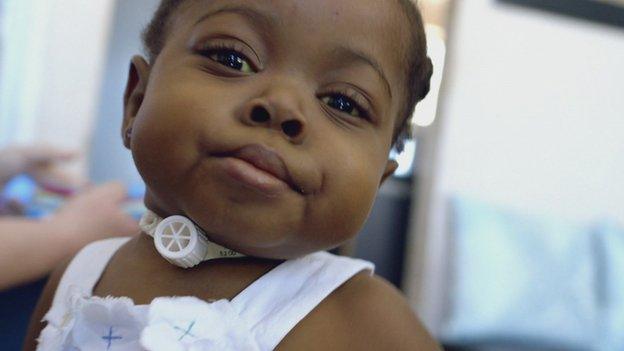
Pamela, 4, was helped by the programme
Sister Jane says that sending the children home is essentially about restoring their quality of lif.:
"Life takes on a new dimension out of the hospital, and it really is about giving children back their childhood and allowing them to enjoy their lives even though they have a life threatening condition and we don't know how long they might live.
"But the life they have we have to give them the best life that we can and that's the whole point of the programme for me, that children can enjoy their lives as much as is possible for them."
The hope is that the Breatheasy scheme can be expanded to help children with other illnesses, such as those who have diabetes or who are on dialysis.
Med in Africa is a brand new eight-part series showcasing health innovations across Africa and what these might mean for the future of healthcare on the continent and beyond.
- Published24 March 2015
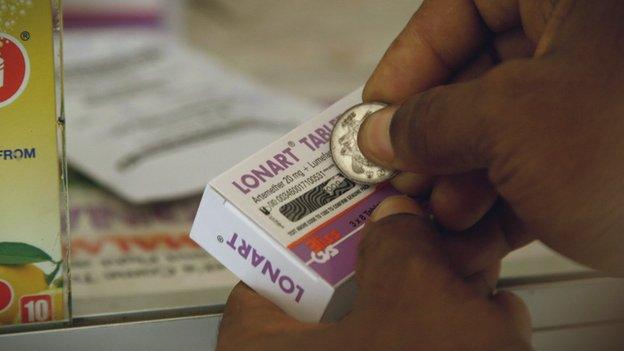
- Published31 March 2015
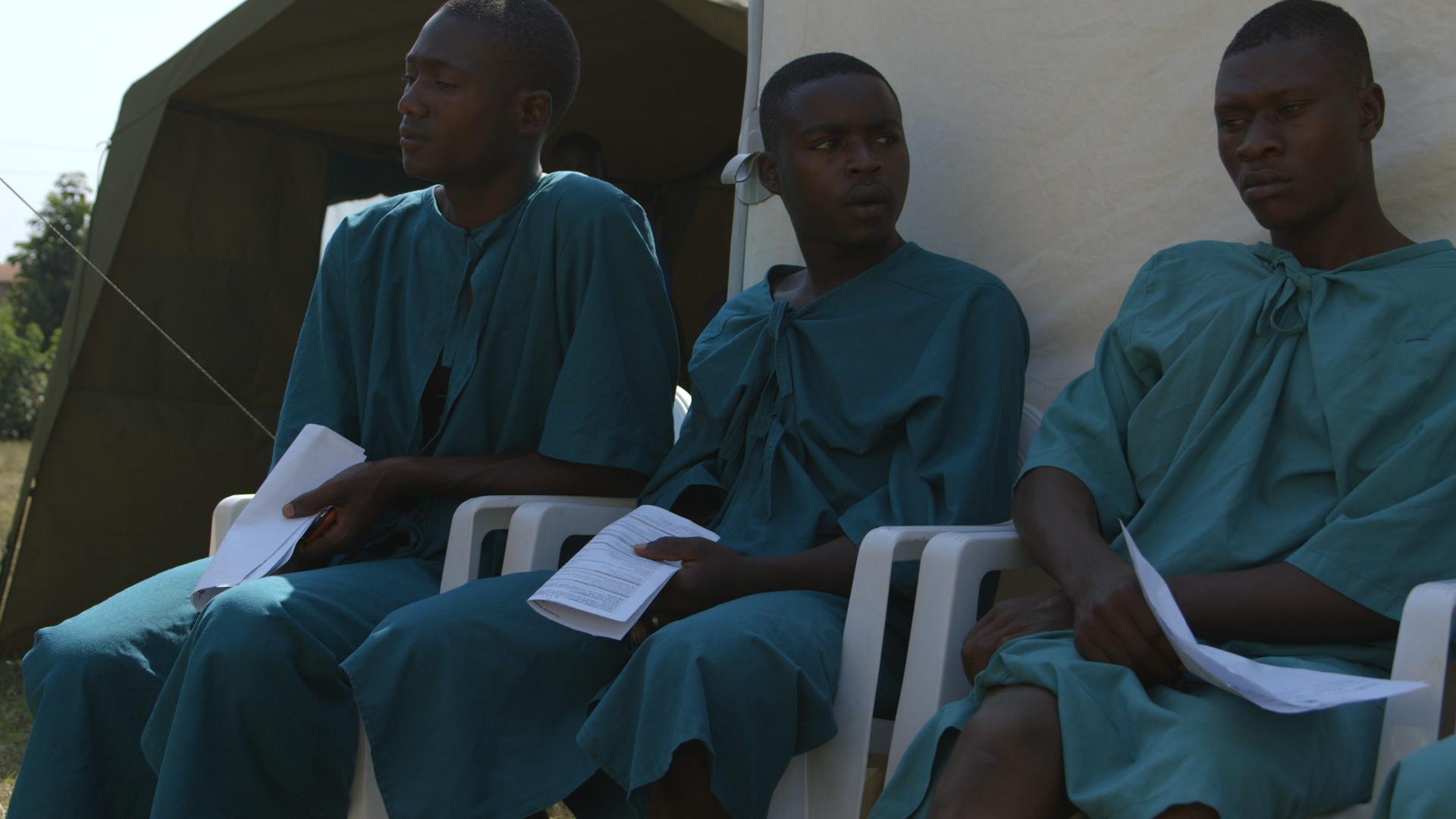
- Published17 March 2015
